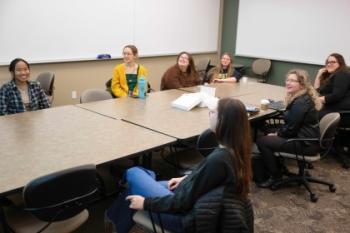College of Liberal Arts & Sciences
GWSS practicum students develop resource for instructors

How can I manage equitable scheduling and accommodation? How do I respond to tragedies affecting student well-being? How can I better understand how mis/gendering students can affect a learning environment?
“What Would You Do? Scenarios and Reflections for Instructors Preparing Inclusive, Equitable, and Trauma-Informed Classrooms” a new resource developed by five Gender, Women’s, and Sexuality Studies (GWSS) students aims to “prompt reflection on situations that might occur in the classroom or during campus interactions” so instructors can prepare strategies “for reacting in supportive ways.”
Jordan Geriane, Violet Heisler, Clare Palmatier, Claire Player, and Olivia Willets created the resource as part of a practicum experience with the Office of Teaching, Learning, and Technology Center for Teaching. They are the third group of GWSS practicum students to develop instructor-facing resources, with previous resources on Using an Inclusive Syllabus to Build Connections with Your Students and Embracing Embodied Learning in Higher Education.
“I hope that instructors can leave our resource with a better understanding of real students' perspectives and that our recommendations can help instructors navigate the real, difficult situation they face in their positions,” says Palmatier.
“What Would You Do?” features seven hypothetical teaching scenarios, each one inspired by the students’ interests and experiences. Each chapter offers evidence-based strategies for navigating sensitive interactions, opportunities for reflection, and thoughtful narratives from a student’s perspective on why selected topics contribute to inclusive classrooms.
“I wanted to use my scenarios to highlight the reality that there is no perfect response to a tough situation, but there are steps faculty can take to foster inclusive and empathetic course structures,” explains Palmatier.
This resource was developed using Pressbooks, an instructional technology tool any Iowa instructor or student can use to create eBooks, handbooks, portfolios, student work collections, and more. Pressbooks offers opportunities for readers to engage with the text, if they choose, by writing private notes that can be downloaded.
“By engaging with our resource, I hope instructors recognize that they are hearing from real students,” says Olivia Willits. “It has been created largely on our personal experiences and having our voices heard is important. Students at the University of Iowa are bringing a wide range of identities and life experiences with them to the classroom and being mindful of this can be very beneficial.”
Developing as Scholars
The students worked with Anastasia Williams, assistant director in the OTLT Center for Teaching, and Anna Bostwick Flaming, director of the Center for Teaching, throughout the fall 2022 semester and consulted with other campus experts.
“The most valuable part of developing this with the Center for Teaching was being able to gain more confidence in my skills as a young professional and a scholar,” says Palmatier. "I feel more comfortable asserting myself as an expert within my field, and I feel that the amazing staff who helped mentor and facilitate the creation of our resource have empowered me as a student and a soon-to-be graduate.”
“We were supported every step of the way, but ultimately, given such creative freedom to decide what kind of project we’d like to do, what form it would take, and develop the scenarios from draft to finished product,” explains Player. “Being in charge of the resource without external requirements bolstered my creative ability to develop a resource that felt like it would make an impact for faculty.”
“This experience has been extremely rewarding and valuable as I was able to work with Anna Flaming, Anastasia Williams, my peers, and additional campus partners who all aided me in developing my part of the resource,” says Willets. “Collaborating with others, sharing ideas, and building skills and confidence that I will take with me post-undergrad, are the things I’m most thankful for.”
To learn more about all the authors, read their bios.
Find additional inclusive classroom resources, including those written by previous practicum students, on our DEI in Teaching practice webpages.